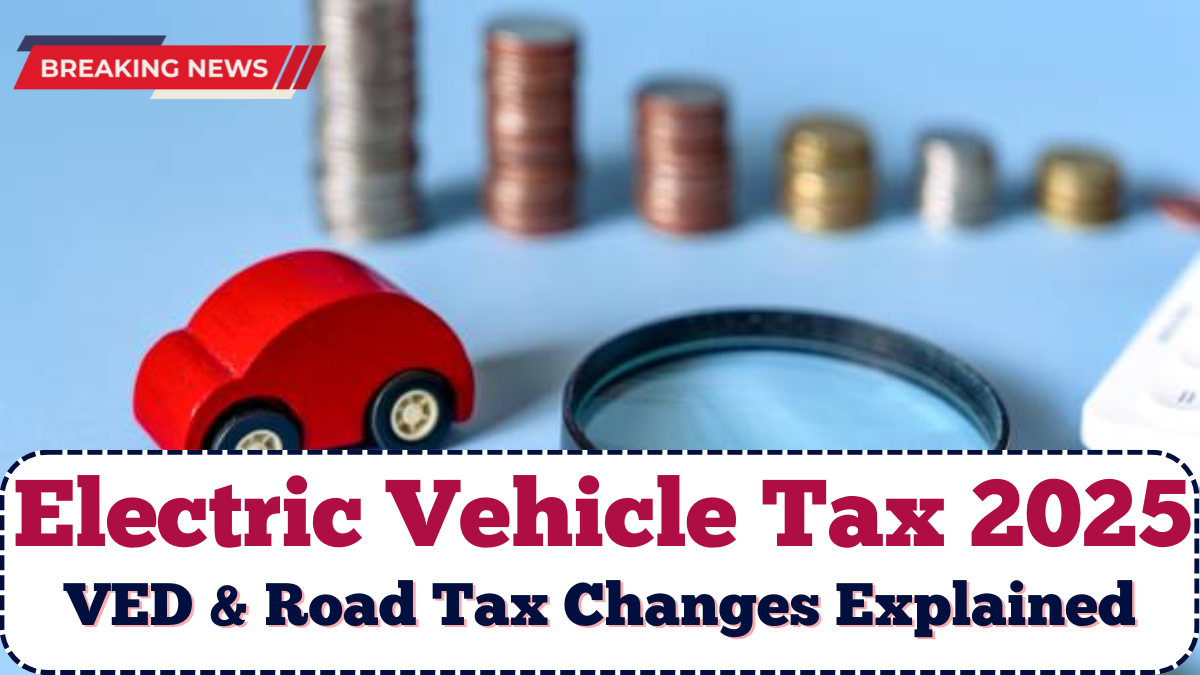The Electric Vehicle Tax UK 2025 is now officially in effect, marking a major shift in how electric vehicle (EV) owners are taxed across the United Kingdom. Starting April 2025, electric cars are no longer exempt from Vehicle Excise Duty (VED). The UK government has introduced a revised road tax system for EVs as part of its broader vehicle taxation reform, aiming to balance revenue collection and environmental support.
This change ends the long-standing VED exemption for battery electric vehicles, meaning EV owners will now pay the same tax bands as petrol and diesel vehicles based on list price and emissions. While incentives still exist for zero-emission cars, the EV tax UK framework now ensures more equal treatment across fuel types.

New VED Rates for Electric Vehicles in 2025
As per the new policy, all electric cars 2025 registered on or after 1 April 2025 will be subject to standard VED charges. The system categorizes vehicles by CO₂ emissions and purchase price, including the £40,000 luxury tax band.
Here’s the breakdown of new electric vehicle tax rates:
| Vehicle Type | First Year VED (2025) | Standard Annual VED | Additional Charge (if >£40,000) |
|---|---|---|---|
| Battery Electric Vehicle | £10 | £180 | £390 for 5 years |
| Plug-in Hybrid Vehicle | £10 – £130 (CO₂-based) | £180 | £390 (if applicable) |
| EVs registered pre-2025 | £0 | £0 (grandfathered) | Not applicable |
While these charges are now being applied, electric vehicles still enjoy significantly lower EV tax UK rates compared to high-emission petrol or diesel models.
Why the EV Tax Policy Was Updated
The government’s decision to update Electric Vehicle Tax UK 2025 is based on the growing popularity of zero-emission vehicles and the need to maintain fair tax contributions across all vehicle classes. As EV ownership rises rapidly, so does the need to include them in the standard tax net without compromising environmental goals.
Reasons for the VED update:
-
Ensure equal tax treatment between fuel types
-
Offset loss of fuel duty revenue as EV sales increase
-
Support long-term road infrastructure funding
-
Phase out unsustainable tax exemptions
-
Encourage smart transition, not dependency
The policy still supports clean transport through reduced annual tax, government grants for EV charging, and discounted ULEZ and congestion charges.
Who Is Affected by the New EV Tax?
The new VED changes apply to:
-
All EVs registered on or after April 1, 2025
-
EV buyers of models priced above £40,000
-
Business fleet operators purchasing electric vans or cars
-
Leasing companies registering new electric vehicles
Owners of EVs purchased and registered before April 2025 remain exempt from VED under the old regime and will not be required to pay road tax unless the vehicle is sold or re-registered.
How to Register and Pay EV Road Tax
Paying the new electric vehicle tax UK 2025 is now integrated into the vehicle registration process. DVLA has updated its portals and dealer networks are required to inform buyers of applicable taxes.
Steps to complete EV tax registration:
-
Purchase or lease a new EV post-1 April 2025
-
Receive V5C document and vehicle tax band from dealer
-
Pay VED online through the DVLA Vehicle Tax portal
-
Set up auto-renewal or pay annually (via Direct Debit)
-
For vehicles over £40,000, additional charge starts from the second year
The payment structure is flexible and can be completed online in minutes. Failure to pay VED results in fines, possible vehicle clamping, and disqualification from insurance claims.
FAQs
Do electric vehicles pay road tax in 2025?
Yes, starting April 2025, all newly registered EVs are required to pay Vehicle Excise Duty (VED) like petrol and diesel vehicles.
How much is the annual EV tax in 2025?
The standard annual VED for electric vehicles is £180. An additional £390 applies for five years if the vehicle’s list price exceeds £40,000.
Are existing EV owners affected by the tax update?
No, EVs registered before 1 April 2025 remain exempt from VED and continue to enjoy zero road tax.
What is the luxury tax on EVs?
EVs with a list price above £40,000 incur an additional £390 annual tax for the first five years after registration, starting from year two.
How do I pay the electric vehicle tax in the UK?
You can pay online using the DVLA’s Vehicle Tax portal. Payments can be set up annually or monthly via Direct Debit.
Are plug-in hybrid vehicles taxed differently?
Yes, plug-in hybrids are taxed based on CO₂ emissions for the first year but fall under the same £180 standard VED rate from the second year onward.
Click here to know more.
